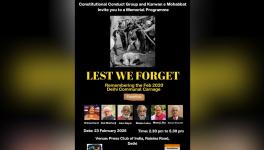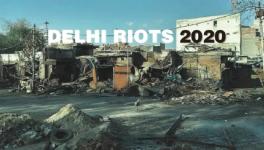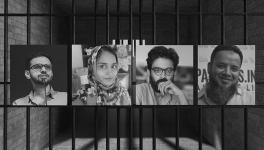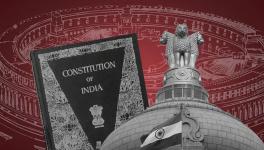Umar Khalid Bail Denial: 'Inquilab' Should Not be Seen as Subversive, Say Academicians
JNU student leader Umar Khalid. Image Courtesy: PTI
New Delhi: After the Delhi High Court objected to the use of the word "inquilab" or revolution in one of the speeches by former JNU student Umar Khalid, historians and scholars argued that it has various meanings in different contexts but never one that exclusively means a call for bloodshed.
While historian S Irfan Habib said that it is very surprising that "inquilab is being seen as something very subversive", Delhi University professor Apoorvanand alleged that the court has taken its meaning to an "absurd level".
The Delhi High Court on Tuesday said revolution by itself is not always bloodless, while referring to former Prime Minister Jawaharlal Nehru who believed democracy has made revolution superfluous after Independence.
A bench of Justices Siddharth Mridul and Rajnish Bhatnagar made the reference while dealing with the content, context and use of certain phraseology in the speeches of Khalid whose bail prayer it rejected in the 2020 north east Delhi riots case.
The court found the speeches prima facie incriminating and inflammatory.
In one of his speeches delivered in February 2020, Khalid used words like "Inquilabli Salam" and "Krantikari Istiqbal".
Habib said the word was first used by Maulana Hasrat Mohani, a pre-independence labour leader, in 1921. It has since been adopted by every political party as a rallying cry against authority and governments.
"'Inquilab zindabad' as a slogan has been used by political parties from left to centre, and even the right wing uses it in their fight against any government which is in power or any authority.
'So, it is not very unusual to say what Umar Khalid said. Merely the use of this word cannot be the reason to put somebody behind the bars," Habib told PTI.
During the arguments on the bail plea, the counsel for Khalid had tried to explain the meaning and import of "Inquilabli Salam" (Revolutionary Salute) and 'Krantikari Istiqbal" (Revolutionary Welcome) by submitting that these words were used for greeting everyone and inviting the spirit of revolution.
However, the bench was "not impressed" with Khalid's argument, saying the call to revolution does not have to affect only the immediate gathering.
"The call to revolution may affect many beyond those who were visibly present, which is why this court finds it apt to mention Robespierre, who was at the vanguard of the French revolution. This court is of the view that possibly, if the appellant had referred to Maximilien Robespierre for what he meant by revolution, he must have also known what revolution meant for our freedom fighter and first prime minister.
"The very fact that Pandit Jawaharlal Nehru believed that democracy has made revolution superfluous after independence and how it meant the complete opposite of a bloodless change," it said.
The bench said, “revolution by itself isn’t always bloodless, which is why it is contradistinctly used with the prefix - a 'bloodless' revolution. So, when we use the expression ‘revolution’, it is not necessarily bloodless”.
Talking about the court's reference to Nehru, Habib noted that he was deemed a revolutionary but none other than Bhagat Singh himself.
"Nehru himself was an 'Inquilabi, according to Bhagat Singh. Bhagat Singh in his article in 1928 called Nehru a krantikari, a revolutionary, one who wanted to bring about a radical change in the country, in the independent India," said the editor of "Inquilab: Bhagat Singh On Religion & Revolution", a collection of Bhagat Singh’s writings.
Delhi University professor Apoorvanand said the word revolution has been used in different contexts but never necessarily means bloodshed.
"The word revolution, 'inquilab', is used in so many different contexts. A politician delivers a revolutionary speech, the nation records revolutionary growth and so on. The word revolution doesn't necessarily mean bloodshed. The court has taken its meaning to an absurd level," the academician said.
Terming Bhagat Singh "the biggest revolutionary", Apoorvanand said, "Bombs and pistols do not make a revolution. The sword of revolution is sharpened on the whetstone of ideas."
Habib also echoed Apoorvanand's thoughts, saying the word 'bloodless' has never been used with 'inquilab'.
"The slogan has never been used as I want bloodless inquilab. It is absolutely silly to even expect. When somebody is talking about inquilab, you do not assume they are talking about violence, you can't assume this," he said.
Get the latest reports & analysis with people's perspective on Protests, movements & deep analytical videos, discussions of the current affairs in your Telegram app. Subscribe to NewsClick's Telegram channel & get Real-Time updates on stories, as they get published on our website.
























